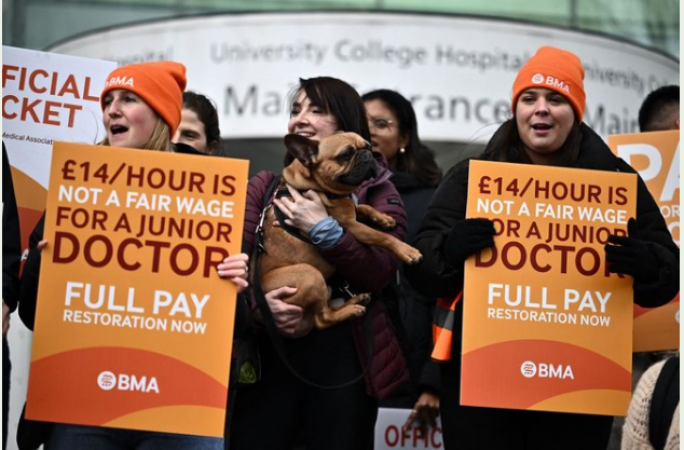
London: Tens of thousands of doctors in England began a five-day walkout on Thursday over pay, starting what is being called the country's longest strike in health care history.
In the years following medical school, so-called junior doctors, who are in the beginning stages of their careers in the National Health Service, began their most recent strike at 7 a.m. Many of them argued for a 35 percent pay increase in picket lines outside hospitals throughout England.
The British Medical Association, the doctors' union, has requested a pay increase of 35% to return junior doctors' pay to 2008 levels after accounting for inflation.
Also Read: "Social evil"? Online gaming's future in India uncertain
The workload of England's roughly 75,000 junior doctors has increased in the meantime as patient waiting lists for treatment have reached all-time highs as a result of the coronavirus pandemic.
The longest single doctor walkout in NHS history began today, but BMA leaders Dr. Robert Laurenson and Dr. Vivek Trivedi said that this record shouldn't be entered into the books.
They urged the British government, which manages health policy in England, to drop its "nonsensical precondition" of refusing to negotiate while strikes are ongoing.
Also Read: MWL meets with the minister of external affairs as his trip to India continues
The government, which is dealing with a variety of strikes by public employees in numerous sectors, is remaining steadfast in its stance that it won't engage in negotiations while the strikes are ongoing.
According to Health Secretary Steve Barclay, this five-day walkout by junior doctors will negatively affect thousands of patients, jeopardise patient safety, and thwart efforts to reduce NHS waiting lists. "A pay demand of at least 35% is unreasonable and runs the risk of causing inflation, which further reduces everyone's purchasing power."
For the first time in years, Britain is experiencing high inflation along with other nations. Supply chain problems brought on by the pandemic initially fueled price increases, followed by Russia's invasion of Ukraine, which drove up the cost of food and energy. Even though it has decreased slightly from its peak to 8.7% percent, inflation is still significantly higher than the Bank of England's target level of 2 percent.
Operations and consultations will be rescheduled or even cancelled as a result of the doctors' strike, which will significantly disrupt the NHS, which is already struggling.
Concerned about the effect on patients, Dr. Simon Steddon, chief medical officer at Guy's and St. Thomas' hospital trust in south London, urged both parties to return to the negotiating table.
He stated that due to prior strikes, nearly 6,000 planned procedures and 55,000 scheduled appointments had already been postponed or cancelled at the hospitals he is in charge of.
Also Read: Biden will host the president of Israel at the White House on Tuesday
"Thousands more will need to be cancelled over the next couple of weeks, adding to the significant delay, inconvenience, and inherent risk of further delaying diagnosis and treatment," he continued.
The doctors who are participating in the strike say they are aware of how their walkout will affect the health system, but they adamantly maintain that they have no other choice.
Alex Gibbs, a striking 31-year-old doctor outside University College Hospital in north London, said, "This isn't a celebration; this is the culmination of years of declining pay, declining conditions, and frustration."